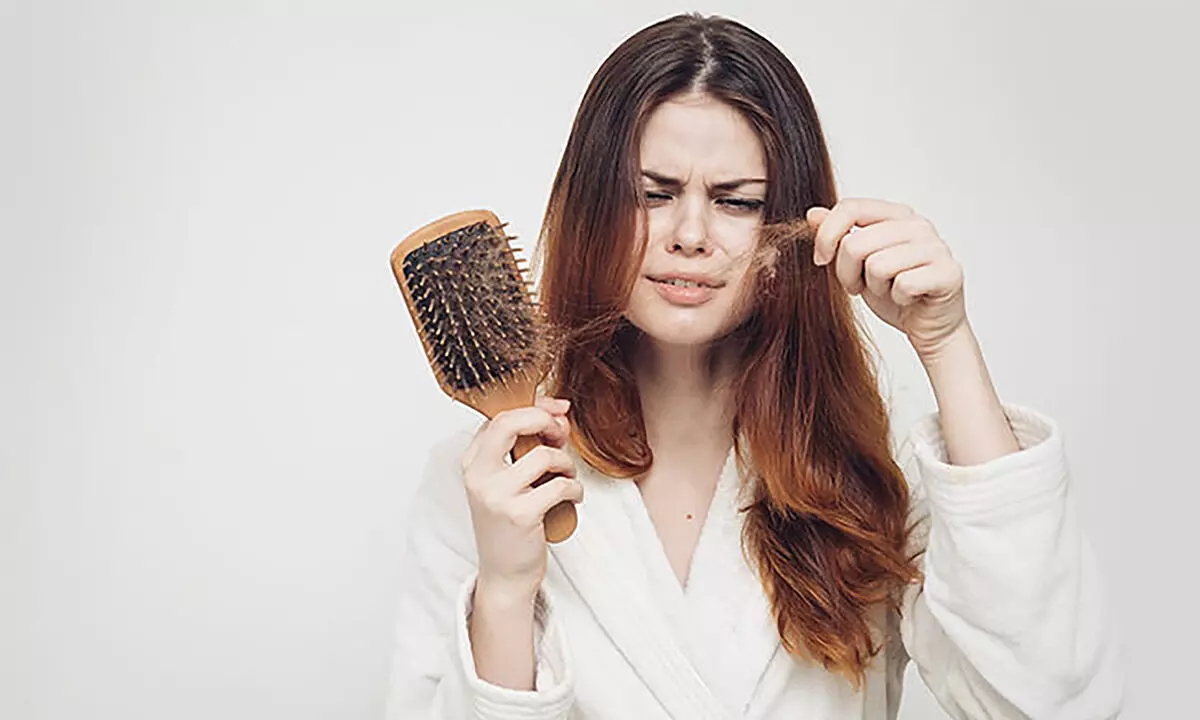Be careful with your hair loss post pregnancy

Approximately 90% of your hair is growing at any one time, while the other 10% enter a resting phase
Approximately 90% of your hair is growing at any one time, while the other 10% enter a resting phase. Every two to three months the resting hair falls out and allows new hair to grow in its place. Telogen effluvium is the excessive shedding of hair that occurs one to five months following pregnancy. Hair loss during pregnancy is not uncommon, as it affects somewhere between 40 to 50% of women; but like most changes during pregnancy, it is temporary but needs reassurance and sometimes a few weeks of treatment with hair growth medications.
Does pregnancy cause abnormal hair loss?
Hair loss that is connected to pregnancy usually occurs after delivery. During pregnancy, an increased number of hairs go into the resting phase, which is part of the normal hair loss cycle.
The positive side of pregnancy and your hair:
During pregnancy, there is an increase in the level of estrogen hormones. Estrogen causes hair to remain in a growing phase and stimulates the growth of your hair. While you are pregnant, you should expect a full, luxurious head of hair.
After pregnancy what happens to hair loss
The most common period of hair loss occurs approximately three months after delivery. The rise in hormones during pregnancy keeps you from losing your hair. After delivery, the hormones return to normal levels, which allows the hair to fall out and return to the normal cycle. The normal hair loss that was delayed during pregnancy may fall out all at once.
Up to 60% of your hair that is in the growth state may enter into the telogen resting state. The hair loss usually peaks 3-4 months after delivery as your hair follicles regenerate themselves. As noted above, this hair loss is temporary, and hair loss returns to normal within six to twelve months. However, some local medications and some vitamins may help the process to help in few women and may be reassuring also.
How do you treat telogen effluvium (temporary hair loss) after pregnancy?
There aren’t any treatments to stop telogen effluvium or to speed up new hair growth. Doctors recommend eating a healthy and balanced diet. This may help hair grow after the shedding phase ends. The hair you shed after having a baby will grow back over time.
Can hair loss be related to other reproductive health issues?
Hair loss can be triggered by anything that involves a change in the estrogen hormone balance in your system.
Hair loss may result from any one or more of the following:
• Discontinuation of birth control pills or any other hormonal type of birth control method
• Miscarriage or stillbirth
• Abortion
• A hormonal imbalance
When does telogen effluvium start after pregnancy?
Postpartum hair loss is a common condition that occurs about three months after childbirth and can last up to six months. It’s a normal part of pregnancy and is only temporary. For most people, your hair will grow back to its original fullness
What foods prevent hair loss after pregnancy?
Optimal nutritional intake can help with hair growth and help to protect hair and follicles. Vitamins and Nutrients may be important for hair growth by generating new cell growth throughout your body. Vitamins A, B, C, D, along with zinc, iron, protein, and selenium help stimulate new hair/cell growth.
Recommendations During Pregnancy and After Delivery:
There are a number of things that you can do to have healthier hair and/or reduce hair loss during pregnancy and after delivery:
• Consult with your health care provider to ensure a proper balance of hormones.
• Avoid pigtails, cornrows, hair weaves, braids and tight hair rollers which can pull and stress your hair.
• Eat a diet high in fruits and vegetables, which contain flavonoids and antioxidants that may provide protection for the hair follicles and encourage hair growth.
• Use shampoos and conditioners that contain biotin and silica
• Hair is fragile when it is wet, so be gentle; avoid fine tooth combs
• If you need to use blow dryers and other heated hair instruments, use the cool setting
Supplement your diet with the following nutrients:
• Vitamin B complex
• Biotin (Possibly safe; orally and appropriately)
• Vitamin C
• Vitamin E (Likely safe if the amount does not exceed the RDA; possibly safe if it does)
• Zinc (most likely safe when used orally and appropriately; likely unsafe when used orally in high doses)
(The author is a Senior Dermatologist and Aesthetic Physician, Aster RV Hospital)











